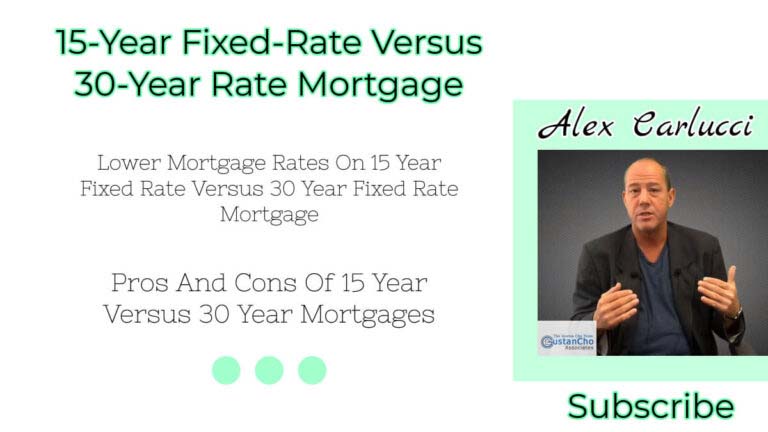How The Federal Reserve Affects Mortgage Rates
In this blog, we will discuss and cover How The Federal Reserve Affects Mortgage Rates. If you pay attention to the news, you have heard quite a bit about the Federal Reserve over the past few years. You have probably heard terms such as transitory or permanent. The Fed Chair Jerome Powell is on record telling the American people that our current inflation issues will be temporary (transitory) and then has since changed his stance. The Federal Reserve as a whole is very confusing! In this blog, we will discuss the role of the Federal Reserve, how the Federal Reserve affects mortgage interest rates, and a few personal thoughts about the Federal Reserve. Gustan Cho Associates are mortgage experts who take pride in staying up to date in all areas of mortgage news, including economic trends set by the Federal Reserve.
History of the Federal Reserve Board
The Federal Reserve was officially started in 1913 when commerce and the economy were much different. The creation of the Federal Reserve was the third attempt at a central banking system in The United States. Woodrow Wilson signed the Federal Reserve Act into law on December 23, 1913. This is important as many members of Congress were not even present to vote on the Act with the Christmas holiday just a few short hours away. The Federal Reserve has been a target of many conspiracy theorists and skeptics for many reasons, starting with the Federal Reserve was created. We will dive deeper into these topics later.
Role of the Federal Reserve Board And How The Federal Reserve Affects Mortgage Rates
According to the Federal Reserve website, they lay out five main functions that explain how the Federal Reserve promotes the effective operation of the U.S. economy and more generally, serves the public interest. The Federal Reserve is made up of three main entities, a Board of Governors, 12 Federal
Reserve banks, and the Federal Open Market Committee.
Five Functions of The Federal Reserve Board
The five functions of the Federal Reserve are as follows:
Conduct monetary policy for the nation.
- This is designed to promote maximum employment, price stability, and monitor long-term interest rates for the U.S. economy.
Promote the stability of our financial system.
- The Federal Reserve seeks to minimize and contain systemic risk through active financial engagement in the United States and abroad
Promote the safety and soundness of individual financial institutions.
- The Federal Reserve will monitor financial institutions impact on the entire financial system
Foster payments in settlement system safety and efficiency.
- This is provided by services to the banking industry and the U.S. government that facilitate U.S. dollar transactions and payments
Promote consumer protection and community development.
- The Federal Reserve has consumer focus supervision, research and analysis of emerging consumer issues or trends, community economic development activities, and the administration of consumer law and regulation
The Power and Control of How The Federal Reserve Affects Mortgage Rates
If you just read these five key functions of the Federal Reserve and have confusion, you are one of many. It is very tough to understand the Federal Reserve and its functions. The less educated you are on the financial markets and the global economy, the more confusing the Federal Reserve concept will be. When the Federal Reserve was developed, this was an attempt to create a central banking system that would broadly represent the public interest.
Which Agency Oversees The Federal Reserve Board?
The Federal Reserve is overseen by Congress and its entities. Below Congress, the Federal Reserve has an open market committee, a Board of Governors, and 12 Federal Reserve banks. Below this structure, the Federal Reserve functions are to oversee depository institutions such as banks, credit unions, and thrifts. The Federal Reserve advisory committees will make recommendations to the Board of Governors and then their reserve banks will put systems in play to benefit the United States population. Once again, we understand how confusing this may sound.
How The Federal Reserve Affects Mortgage Rates And Our Monetary Policy
The Federal Reserve defines a depository institution as follows. A depository is the institution offering transactions, or checking accounts to the public, and will maintain accounts of their own transactions at their local Federal Reserve bank. Depository institutions are required to meet requirements set by these reserve banks.
How Monetary Policy System Works
They must also keep a certain amount of cash on hand or in the account at the Federal Reserve bank based on the balance in their checking accounts held. If a depository institution has higher balances in their Federal Reserve account then, they need to meet reserve requirements. These reserve requirements may be lent to other depository institutions that are in need of the funds to satisfy this reserve requirement. These rates will influence interest rates, prices and wealth, exchange rates, and will then aggregate demand in the economy. The target Federal Reserve rate is discussed during Federal Reserve board meetings and their results trickle down into our economy.
Advisory Councils Advising Board of Governors

There are four main advisory councils that advise the Board of Governors over matters of public policy. These matters have become more transparent to the public during the COVID-19 coronavirus outbreak and other financial struggles throughout our country. The four advisory councils are as follows:
Federal Advisory Council (FAC):
- The Federal Reserve Act instituted 12 representatives of the banking industry.
- The FAC will meet with the board four times a year which is required by law.
- Then once a year, each reserve bank will choose one person to represent its district on the Federal Advisory Council.
- These members will serve a three-year term and then elect their own officers.
Community Depository Institutions Advisory Council (CDIAC):
- This is a long-winded term for a group established by the Board of Governors to obtain information from banking institutions as well as credit unions and community banks.
- This counsel provides the Board of Governors with first-hand insight and information about the economy, lending conditions, and other financial issues.
Model validation council:
- n the year 2012, the Board of Governors established expert and independent counsel to regularly assess models used in stress tests of banking institutions.
- Stress tests are required under the Dodd-Frank Wall Street reform and consumer protection act added by Congress in the blank.
- This counsel uses data to strengthen confidence in the overall banking systems especially in times of crisis.
Community Advisory Council (CAC):
- This council was formed in 2015 in order to offer diverse perspectives on the economic circumstances and financial service needs of consumers.
- This counsel mainly focuses on the concerns of low and moderate-income populations.
- This board will meet with the Board of Governors twice a year and is made up of 15 members.
- These members are selected by the Board of Governors through a public nomination process.
The Federal Reserve banks will also have their own committees. These committees advise on the banks of agriculture, small business, and labor matters. The views of these committees are given twice a year and have a substantial impact on the future policies set in place by the Federal Reserve.
Who Owns The Federal Reserve Board
When you click the frequently asked questions page on the Federal Reserve website, the first question is who owns the Federal Reserve? The answer is long-winded and highly confusing. The Federal Reserve system is not technically owned by anybody. The Federal Reserve was created in 1913 by the Federal
Reserve Act to serve as the Nation’s central bank. The Federal Reserve derives its authority from Congress created the system in 1913. If you are like many Americans, you have lost some trust in our congressional leaders.
Does The Federal Reserve Board Control Inflation?
If your thoughts are similar to mine, you may be asking what is the Federal Reserve doing to influence the rapid rate of inflation and unemployment? According to the Federal Reserve, they are putting in monetary policy to help inflation and the economic demand for goods and services. The demand for employees to produce these goods and services is also a key factor in these decisions. The Federal Reserve’s main tool against inflation is changing the federal funds rate. The federal funds rate is the rate that banks pay for overnight borrowing in the federal funds market.
How The Federal Reserve Affects Mortgage Rates By Changing Federal Funds Rates
Changing the federal funds rate will influence other interest rates that in turn influence borrowing costs for households and businesses. When interest rates go down, it then becomes cheaper to borrow money, so households are more willing to buy goods and services, which will, in turn, boost the economy. During economic downturns, the Federal Reserve will usually lower the federal funds rate as close to zero as possible. Unfortunately, the federal funds rate has been at zero since the start of the COVID-19 coronavirus outbreak and inflation has only gone up and up. Thousands of Americans are in dire straits due to the increase in the cost of goods and services.
How The Federal Reserve Affects Mortgage Rates and the Mortgage Markets
We want to be clear; the Federal Reserve does not directly set mortgage interest rates however, they do create a monetary policy that will affect mortgage interest rates. The influence of the price of credit will then be reflected in mortgage interest rates offered by lenders. Typically, the Federal Reserve will step in during economic uncertainties. They will utilize quantitative easing programs and purchase higher amounts of mortgage back securities and other government debts in the form of treasury bonds. These policies will then be passed down to the consumer with higher or lower interest rates.
How The Federal Reserve Affects Mortgage Rates and Financial markets
Since the Federal Reserve directly imposes monetary policy, they really do have control over the entire open financial markets. They have a ripple effect, by making money more expensive to borrow, banks will then pass on higher interest rates to their consumers. As short-term interest rates go up, typically long-term interest rates go up as well. For example, the interest rate on the 10-year Treasury bond will typically influence the rate on your conventional 30-year mortgage products. These tend to go up in sync. If you have been following the news, you are aware that the current borrowing rate is incredibly low. This is a great time to get a mortgage either buying a home or refinancing your current mortgage. The Federal Reserve has already announced they plan on raising interest rates multiple times during the calendar year of 2022.
Why are so many Americans skeptical when it comes to the Federal Reserve?
The Federal Reserve is no stranger to conspiracy theorists. In fact, many people believe the Federal Reserve is controlled by the “Illuminati” or foreign countries. While technically the Federal Reserve is not owned or controlled by one group or entity, many people believe there are some shady players involved. Foreign financial institutions are not allowed to buy stock in any reserve bank which should ensure the system is not subject to foreign interests. However, domestic banks can buy stock in reserve banks but are not allowed to trade or sell the shares.
Is The Federal Reserve Board To Blame For The Great Depression?

Many people believe the Federal Reserve is to blame for the great depression. In the 1930s, America entered what is referred to as the great depression. During this time, in response to the crashing economy, the Federal Reserve actually tightened the money supply and worsened the crisis. Since then, many have been skeptical of the decisions made by the Federal Reserve. In our most recent financial emergency, the COVID-19 coronavirus outbreak, the Federal Reserve did the opposite. Many believe the Federal Reserve prints and distributes cash which in fact they do not.
How Printing Money Works
The Federal Reserve does not print money, that is the job of the U.S. Treasury. However, the Federal Reserve does control the money supply which will create confusion. Since the COVID-19 coronavirus outbreak, the M4 money supply has never been larger. This has many worried about a crash in the near future. Similar to the Federal Reserve’s actions during the real estate crash of 2008, the Federal Reserve has participated in quantitative easing. This method includes lowering interest rates, purchasing bonds and securities, and pumping money into the banking system through direct payments to Americans.
The legitimacy of the Federal Reserve Board
Here’s what I found: many Americans believe the Federal Reserve is unconstitutional. Many believe this because there is nothing specifically stated in the constitution about creating a central bank or even a central banking system. Many believe the founding fathers never anticipated a central bank messing with our economy. The Federal Reserve will fall into a gray area because the founding fathers did not specify any government role in creating and regulating money. Regulating commerce and manipulating the money supply is one of the main functions of the Federal Reserve.
Gustan Cho Associates are mortgage experts and are able to lend in numerous States without mortgage lender overlays. We do our best to assist our clients as fast as possible. Our team has grown quite a bit over the past year and we are here to service you and your family. For any mortgage-related questions please contact Mike Gracz on (800) 900-8569. You may also email any questions directly to mike@gustancho.com. We are available seven days a week to assist you in any way possible.






